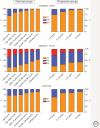Host genes important to HIV replication and evolution
- PMID: 22474614
- PMCID: PMC3312401
- DOI: 10.1101/cshperspect.a007203
Host genes important to HIV replication and evolution
Abstract
Recent years have seen a significant increase in understanding of the host genetic and genomic determinants of susceptibility to HIV-1 infection and disease progression, driven in large part by candidate gene studies, genome-wide association studies, genome-wide transcriptome analyses, and large-scale in vitro genome screens. These studies have identified common variants in some host loci that clearly influence disease progression, characterized the scale and dynamics of gene and protein expression changes in response to infection, and provided the first comprehensive catalogs of genes and pathways involved in viral replication. Experimental models of AIDS and studies in natural hosts of primate lentiviruses have complemented and in some cases extended these findings. As the relevant technology continues to progress, the expectation is that such studies will increase in depth (e.g., to include host whole exome and whole genome sequencing) and in breadth (in particular, by integrating multiple data types).
Figures



References
-
- Allen TM, O’Connor DH, Jing P, Dzuris JL, Mothe BR, Vogel TU, Dunphy E, Liebl ME, Emerson C, Wilson N, et al. 2000. Tat-specific cytotoxic T lymphocytes select for SIV escape variants during resolution of primary viraemia. Nature 407: 386–390 - PubMed
-
- Ambrose Z, KewalRamani VN, Bieniasz PD, Hatziioannou T 2007. HIV/AIDS: In search of an animal model. Trends Biotechnol 25: 333–337 - PubMed
-
- Apetrei C, Robertson DL, Marx PA 2004. The history of SIVS and AIDS: Epidemiology, phylogeny and biology of isolates from naturally SIV infected non-human primates (NHP) in Africa. Front Biosci 9: 225–254 - PubMed
-
- Ballana E, Senserrich J, Pauls E, Faner R, Mercader JM, Uyttebroeck F, Palou E, Mena MP, Grau E, Clotet B, et al. 2010. ZNRD1 (zinc ribbon domain-containing 1) is a host cellular factor that influences HIV-1 replication and disease progression. Clin Infect Dis 50: 1022–1032 - PubMed
Publication types
MeSH terms
Substances
LinkOut - more resources
Full Text Sources
Medical
Research Materials
